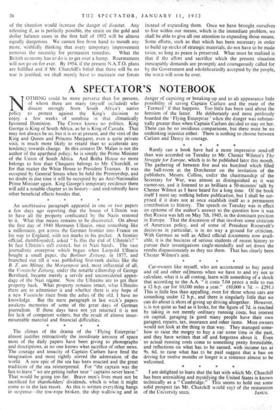Rarely can a book have had a more impressive send-off
than was accorded on Tuesday to Mr. Chester Wilmot's The Struggle for Europe, which is to be published later this month. The gathering of between five and six hundred which filled the ball-room at the Dorchester on the invitation of the publishers, Messrs. Collins, under the chairmanship of the Secretary for War, was almost as distinguished as it was numerous, and it listened to as brilliant a 50-minutes' talk by Chester Wilmot as I have heard for a long time. Of the book itself I must say nothing before publication, but I shall be sur- prised if it does not at once establish itself as a permanent contribution to history. The speech on Tuesday was in effect an epitome of the author's answer to the question how it was that Russia was left on May 7th, 1945, in the dominant position in Europe. That the discussion of that involves some criticism of American policy, and of some of President Roosevelt's decisions in particular, is in no way a ground for criticism. With German as well as Allied official documents now avail- able, it is the business of serious students of recent history to pursue their investigations single-mindedly and set down the results dispassionately as they see them. That has clearly been Chester Wilmot's aim.


































 Previous page
Previous page